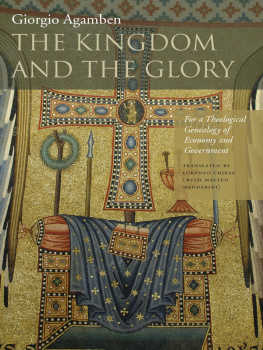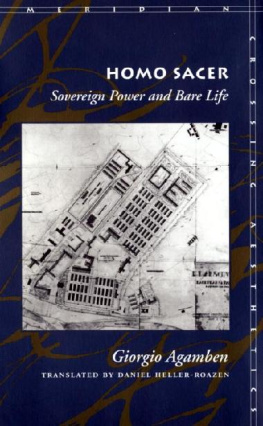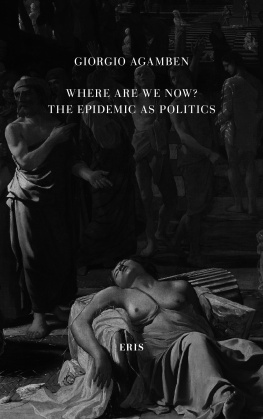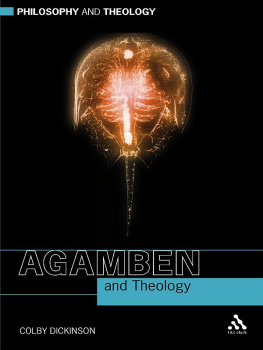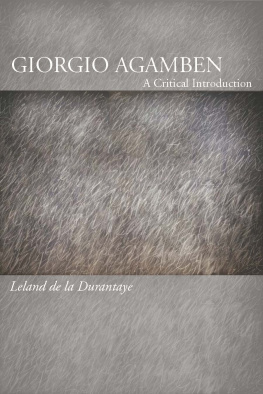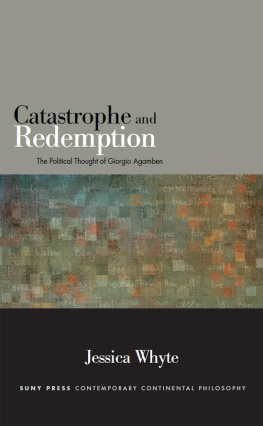Giorgio Agamben - State Of Exception
Here you can read online Giorgio Agamben - State Of Exception full text of the book (entire story) in english for free. Download pdf and epub, get meaning, cover and reviews about this ebook. year: 0, publisher: University of Chicago Press, genre: Science / Politics. Description of the work, (preface) as well as reviews are available. Best literature library LitArk.com created for fans of good reading and offers a wide selection of genres:
Romance novel
Science fiction
Adventure
Detective
Science
History
Home and family
Prose
Art
Politics
Computer
Non-fiction
Religion
Business
Children
Humor
Choose a favorite category and find really read worthwhile books. Enjoy immersion in the world of imagination, feel the emotions of the characters or learn something new for yourself, make an fascinating discovery.

- Book:State Of Exception
- Author:
- Publisher:University of Chicago Press
- Genre:
- Year:0
- Rating:3 / 5
- Favourites:Add to favourites
- Your mark:
- 60
- 1
- 2
- 3
- 4
- 5
State Of Exception: summary, description and annotation
We offer to read an annotation, description, summary or preface (depends on what the author of the book "State Of Exception" wrote himself). If you haven't found the necessary information about the book — write in the comments, we will try to find it.
State Of Exception — read online for free the complete book (whole text) full work
Below is the text of the book, divided by pages. System saving the place of the last page read, allows you to conveniently read the book "State Of Exception" online for free, without having to search again every time where you left off. Put a bookmark, and you can go to the page where you finished reading at any time.
Font size:
Interval:
Bookmark:



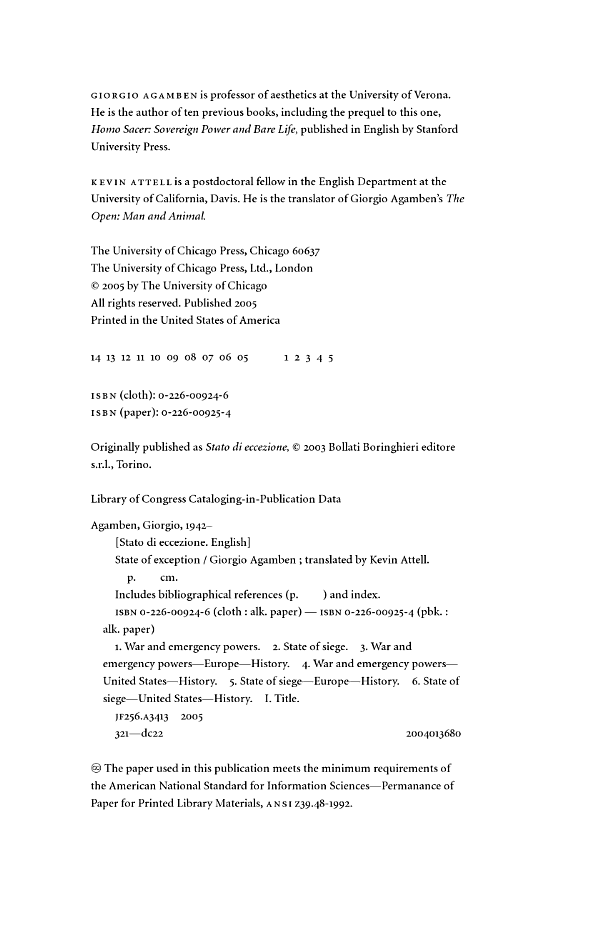
Translators Note
Wherever possible, I have included references to published English translations of Agambens French, German, and Italian sources in the references list. However, in order to maintain consistency in terminology throughout the text, and to better reflect Agambens own translations of these sources,the published English versions have frequently been modified. Where an English edition is listed in the bibliography, the first page number in the text citation refers to the original, and the second to the English edition (e.g., [Benjamin 1942, 697/257]). Where no English edition is listed, the translation is mine.
I would like to give my deepest thanks to Courtney Booker, David Copen-hafer, Samuel Gilbert, Sirietta Simoncini, and to Giorgio Agamben for their generous help in preparing this translation.
Quare siletis juristae in munere vestro?
[Why are you jurists silent about that which concerns you?]
1 The State of Exception as a Paradigm of Government
1.1 The essential contiguity between the state of exception and sovereignty was established by Carl Schmitt in his book Politische Theologie (1922). Although his famous definition of the sovereign as he who decides on the state of exception has been widely commented on and discussed, there is still no theory of the state of exception in public law, and jurists and theorists of public law seem to regard the problem more as a quaestio facti than as a genuine juridical problem. Not only is such a theory deemed illegitimate by those authors who (following the ancient maxim according to which necessitas legem non habet [necessity has no law]) affirm that the state of necessity, on which the exception is founded, cannot have a juridical form, but it is difficult even to arrive at a definition of the term given its position at the limit between politics and law. Indeed, according to a widely held opinion, the state of exception constitutes a point of imbalance between public law and political fact (Saint-Bonnet 2001, 28) that is situatedlike civil war, insurrection and resistancein an ambiguous, uncertain, borderline fringe, at the intersection of the legal and the political (Fontana 1999, 16). The question of borders becomes all the more urgent: if exceptional measures are the result of periods of political crisis and, as such, must be understood on political and not juridico-constitutional grounds (De Martino1973,320),then they find themselves in the paradoxical position of being juridical measures that cannot be understood in legal terms, and the state of exception appears as the legal form of what cannot have legal form. On the other hand, if the law employs the exceptionthat is the suspension of law itselfas its original means of referring to and encompassing life, then a theory of the state of exception is the preliminary condition for any definition of the relation that binds and, at the same time, abandons the living being to law.
It is this no-mans-land between public law and political fact, and between the juridical order and life, that the present study seeks to investigate. Only if the veil covering this ambiguous zone is lifted will we be able to approach an understanding of the stakes involved in the differenceor the supposed differencebetween the political and the juridical, and between law and the living being. And perhaps only then will it be possible to answer the question that never ceases to reverberate in the history of Western politics: what does it mean to act politically?
1.2 One of the elements that make the state of exception so difficult to define is certainly its close relationship to civil war, insurrection, and resistance. Because civil war is the opposite of normal conditions, it lies in a zone of undecidability with respect to the state of exception,which is state powers immediate response to the most extreme internal conflicts. Thus, over the course of the twentieth century, we have been able to witness a paradoxical phenomenon that has been effectively defined as a legalcivilwar(Schnur1983).LetustakethecaseoftheNaziState.No sooner did Hitler take power (or, as we should perhaps more accurately say, no sooner was power given to him) than, on February 28, he proclaimed the Decree for the Protection of the People and the State, which suspended the articles of the Weimar Constitution concerning personal liberties. The decree was never repealed, so that from a juridical standpoint the entire Third Reich can be considered a state of exception that lasted twelve years. In this sense, modern totalitarianism can be defined as the establishment, by means of the state of exception, of a legal civil war that allows for the physical elimination not only of political adversaries but of entire categories of citizens who for some reason cannot be integrated into the political system. Since then, the voluntary creation of a permanent state of emergency (though perhaps not declared in the technical sense) has become one of the essential practices of contemporary states, including so-called democratic ones.
Faced with the unstoppable progression of what has been called a global civil war, the state of exception tends increasingly to appear as the dominant paradigm of government in contemporary politics. This transformation of a provisional and exceptional measure into a technique of government threatens radically to alterin fact, has already palpably alteredthe structure and meaning of the traditional distinction between constitutional forms. Indeed, from this perspective, the state of exception appears as a threshold of indeterminacy between democracy and absolutism.
The expression global civil war appears in the same year (1963) in both Hannah Arendts On Revolution and Carl Schmitts Theory of the Partisan. However, as we will see, the distinction between a real state of exception (tat de sige effectif) and a fictitious state of exception (tat de sige fictif) goes back to French public law theory and was already clearly articulated in Theodor Reinachs book De ltat de sige. tude historique et juridique (1885), which is at the origins of the Schmittian and Benjaminian opposition between a real and a fictitious state of exception. Anglo-Saxon jurisprudence prefers to speak here of fancied emergency. For their part, Nazi jurists spoke openly of a gewollte Ausnahmezustand, a willed state of exception, for the sake of establishing the National Socialist State (Werner Spohr, quoted in Drobische and Wieland 1993, 28).
1.3 The immediately biopolitical significance of the state of exception as the original structure in which law encompasses living beings by means of its own suspension emerges clearly in the military order issued by the president of the United States on November 13, 2001, which authorized the indefinite detention and trial by military commissions (not to be confused with the military tribunals provided for by the law of war) of noncitizens suspected of involvement in terrorist activities.
The USA Patriot Act issued by the U.S. Senate on October 26, 2001, already allowed the attorney general to take into custody any alien suspected of activities that endangered the national security of the United States, but within seven days the alien had to be either released or charged with the violation of immigration laws or some other criminal offense. What is new about President Bushs order is that it radically erases any legal status of the individual, thus producing a legally unnamable and unclassifiable being. Not only do the Taliban captured in Afghanistan not enjoy the status of POWs as defined by the Geneva Convention, they do not even have the status of persons charged with a crime according to American laws. Neither prisoners nor persons accused, but simply detainees, they are the object of a pure de facto rule, of a detention that is indefinite not only in the temporal sense but in its very nature as well, since it is entirely removed from the law and from judicial oversight.The only thing to which it could possibly be compared is the legal situation of the Jews in the Nazi Lager [camps], who, along with their citizenship, had lost every legal identity, but at least retained their identity as Jews. As Judith Butler has effectively shown, in the detainee at Guantnamo, bare life reaches its maximum indeterminacy.
Font size:
Interval:
Bookmark:
Similar books «State Of Exception»
Look at similar books to State Of Exception. We have selected literature similar in name and meaning in the hope of providing readers with more options to find new, interesting, not yet read works.
Discussion, reviews of the book State Of Exception and just readers' own opinions. Leave your comments, write what you think about the work, its meaning or the main characters. Specify what exactly you liked and what you didn't like, and why you think so.

